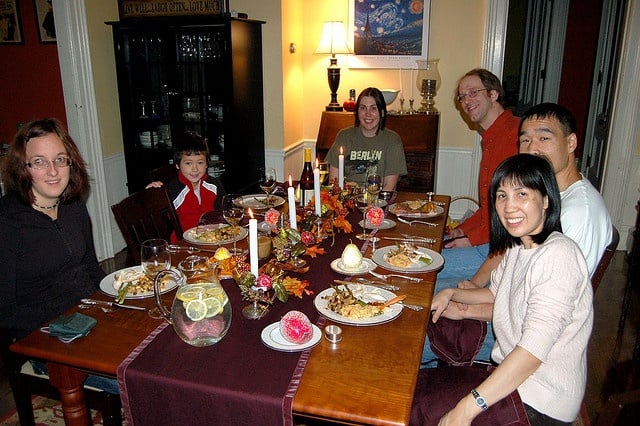By Carol Pierson Holding
Amidst the national stories about the recent take-over of the U.S. Senate by Republicans and their ardent intentions to eviscerate both the environment (see Big Oil’s Wish List) and human rights (as in reproductive rights, minimum wage and so on), a bit of sunshine peaked out of my Seattle Times: two of our top chain retailers, Costco and Nordstrom, are opting to stay closed on Thanksgiving Day.
Why? To respond to the public backlash, of course, but also to ensure their employees spend Thanksgiving the way it’s supposed to be spent, with family and friends.
Closing on Thanksgiving isn’t the only way these companies are good to their employees. They lead Forbes 2014 Best Retail Companies to Work for Right Now list, with Costco at #1 and Nordstrom Rack at #2. Both companies not only have family-friendly policies, they pay their employees better.
In 2011, Nordstrom paid 60% more in hourly wages than the industry average. A typical Costco worker earned $45,000 in 2011 according to a survey by Glassdoor, compared to Sam’s Club workers’ average annual salary of $17,486.
Certainly, there is a strong economic argument to be made for treating employees better. Frederick F. Reichheld’s 2001 study The Loyalty Effect proved that customers are loyal not so much to a store as to its employees. Reichheld maintained that a five percent increase in the employee retention rate can increase a customer’s lifetime value by as much as 75%, in part because of the high cost of bringing in new customers. It seems to be working: as reported in Huffington Post last year, Costco’s profits soared 19 percent even as the retailer paid substantially higher wages. Nordstrom Rack’s sales increased 10.2%.It’s clear that employees and economics benefit from Costco and Nordstrom’s decent treatment of employees. But closing on Thanksgiving could actively hurt consumerism, possibly over the long-term: once stores close down for one day, aren’t these retailers in danger of teaching their customers how not to shop, especially in their stores?
I was struck once again at the differences between the Pacific Northwest and the rest of the country. Certainly, chains headquartered in other places are also closed on Thanksgiving. Barnes & Noble, GameStop, Joanne Fabric, Pier 1, Marshalls, TJ Maxx and Top 10 retailers Burlington (projected to be #6 in profits for 2014) and Dillards (#2) are joining in.But you have to wonder why any retailer would want to take an action to stem consumerism, their very life-blood, and why two of the chains closing for Thanksgiving would be headquartered in the Seattle area?
One clue is its politics. Washington State’s Governor Jay Inslee is best known as the "greenest governor." But he is also a crusader for worker’s rights. He calls it “protecting our most vulnerable, and protecting our environment” and champions raising the State’s minimum wage even higher than it already is, which at $9.32 is the highest state-wide minimum wage in the country. Seattle’s city council voted this June to gradually raise its hourly minimum to $15.
This might seem counterintuitive. The party line, especially in red states, is that environmental protection and jobs are in a heated battle for resources. Yet the Pacific Northwest is growing economically even while it fights against fossil fuel consumption, closing coal plants, denying coal port permits, increasing investment in renewables and reducing energy use.
And the dogma that lifting wages will bankrupt businesses? Nordstrom’s and Costco wouldn’t agree.
Have a lovely shopping-free Thanksgiving!
Photo courtesy of ilovebutter via Flickr cc.
 Carol Pierson Holding writes on environmental issues and social responsibility for policy and news publications, including the Carnegie Council’s Policy Innovations, Harvard Business Review, San Francisco Chronicle, India Time, The Huffington Post and many other web sites. Her articles on corporate social responsibility can be found on CSRHub.com, a website that provides sustainability ratings data on 9,300+ companies worldwide. Carol holds degrees from Smith College and Harvard University.
Carol Pierson Holding writes on environmental issues and social responsibility for policy and news publications, including the Carnegie Council’s Policy Innovations, Harvard Business Review, San Francisco Chronicle, India Time, The Huffington Post and many other web sites. Her articles on corporate social responsibility can be found on CSRHub.com, a website that provides sustainability ratings data on 9,300+ companies worldwide. Carol holds degrees from Smith College and Harvard University.
CSRHub provides access to corporate social responsibility and sustainability ratings and information on 9,300+ companies from 135 industries in 106 countries. By aggregating and normalizing the information from 343 data sources, CSRHub has created a broad, consistent rating system and a searchable database that links millions of rating elements back to their source. Managers, researchers and activists use CSRHub to benchmark company performance, learn how stakeholders evaluate company CSR practices and seek ways to change the world.
